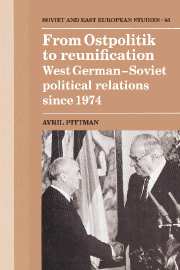Book contents
- Frontmatter
- Contents
- List of tables
- Preface
- Note on text
- Chronology
- Introduction
- 1 The Second World War and its aftermath, 1945–1974
- 2 Ethnic Germans
- 3 Berlin
- 4 The Federal Republic of Germany's relations with the German Democratic Republic
- 5 INF, Afghanistan and the post-Afghanistan period
- 6 Assessment of the Federal Republic of Germany's relations with the Soviet Union, 1974–1982
- 7 The Federal Republic of Germany's political relations with the Soviet Union after 1982
- Appendices
- Notes
- Bibliography
- Index
- Series list
Introduction
Published online by Cambridge University Press: 12 October 2009
- Frontmatter
- Contents
- List of tables
- Preface
- Note on text
- Chronology
- Introduction
- 1 The Second World War and its aftermath, 1945–1974
- 2 Ethnic Germans
- 3 Berlin
- 4 The Federal Republic of Germany's relations with the German Democratic Republic
- 5 INF, Afghanistan and the post-Afghanistan period
- 6 Assessment of the Federal Republic of Germany's relations with the Soviet Union, 1974–1982
- 7 The Federal Republic of Germany's political relations with the Soviet Union after 1982
- Appendices
- Notes
- Bibliography
- Index
- Series list
Summary
This study is an examination of FRG–USSR political relations between 1974 and 1982. The study concentrates on the West German side of FRG–USSR relations in the ‘follow-on’ period to the innovatory ‘treaty’ period of Ostpolitik. It was a period when the overall climate of détente began to deteriorate, culminating in the Afghanistan crisis.
The study is chiefly grounded on the West German side of FRG–USSR relations, though chapter 7 is a partial exception where events after 1982 are dealt with and where the focus inevitably shifts to the USSR.
Three main types of sources are used in the study: interviews with West German government and party officials; West German official public documents; and West German, British, United States, and French literature and press sources. No interviews of Soviet officials were conducted, nor were original Soviet sources used. However, where the Soviet side is brought in, the author has striven to produce as accurate a picture as possible using Western sources (particularly those having access to Eastern sources not open to the author) and interviews with West German government and party officials.
With regard to the reliability of public statements made by the Chancellor during this period, Schmidt is one of those politicians who seem to put ‘a lot of themselves’ into their speeches and his speeches are generally acknowledged to be very valuable and informative. Certainly Chancellor Schmidt is very much associated with the terms Berechenbarkeit, Glaubwürdigkeit, Stetigkeit, and Vorhersehbarkeit (‘calculability’, ‘credibility’, ‘constancy’, and ‘predictability’).
- Type
- Chapter
- Information
- From Ostpolitik to ReunificationWest German-Soviet Political Relations since 1974, pp. 1 - 4Publisher: Cambridge University PressPrint publication year: 1992

